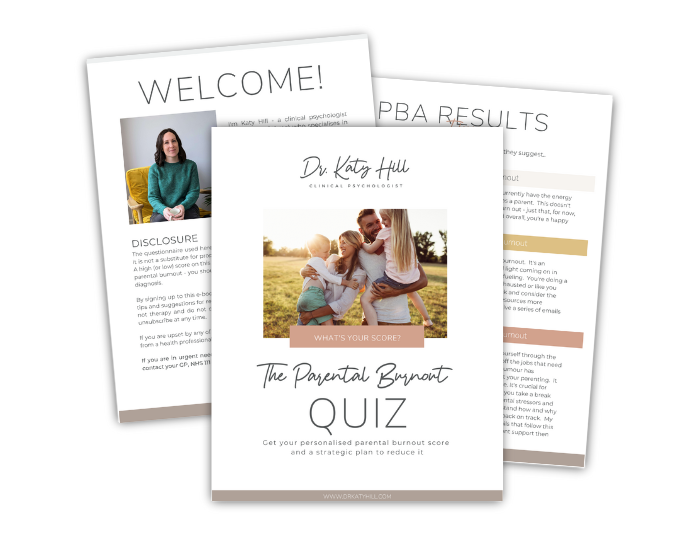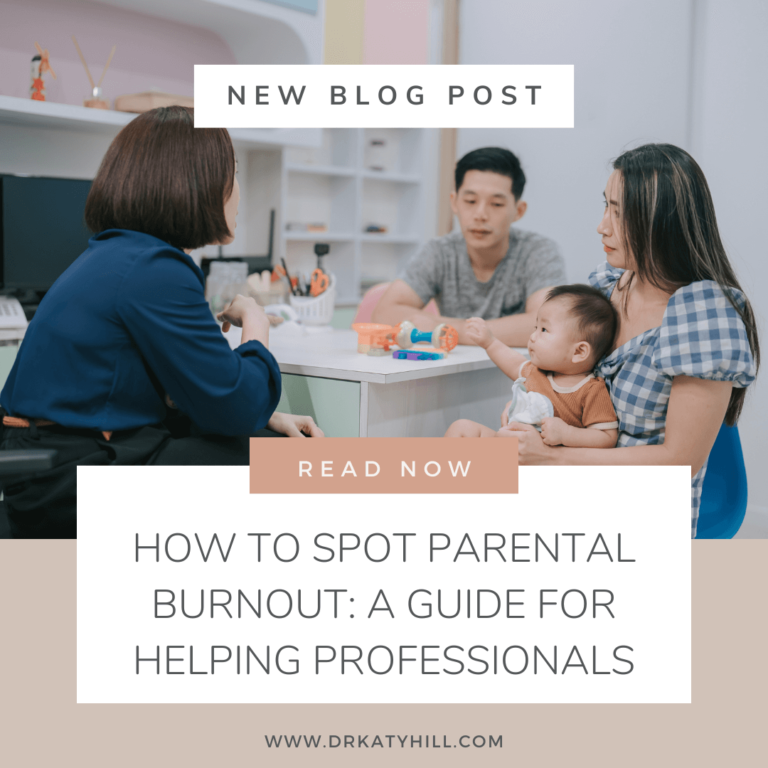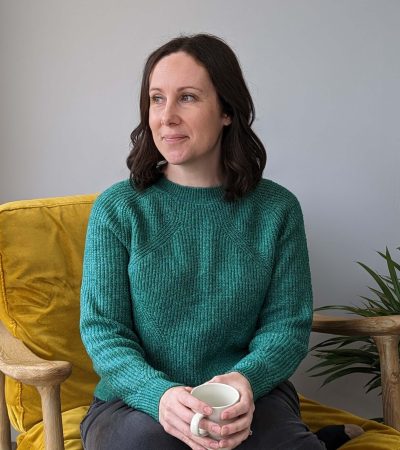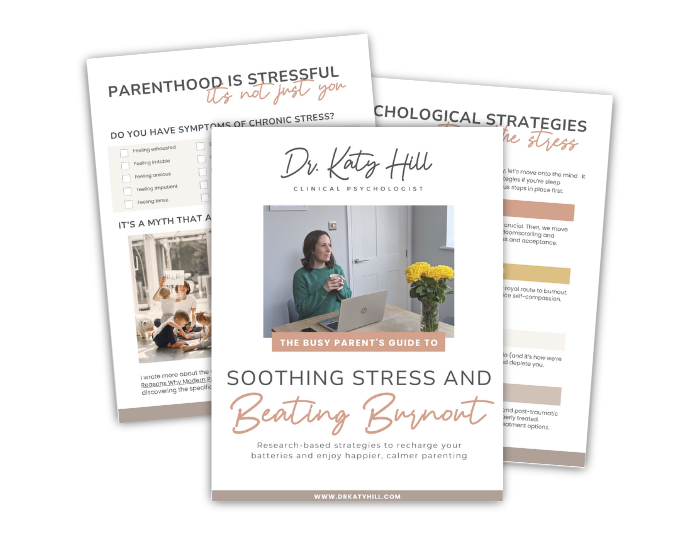Most of my blogs are aimed at parents but this one is all about how to spot parental burnout for helping professionals (medics, teachers, social workers, childcare professionals etc.).
With an estimated 5% of parents feeling burned out, it’s inevitable that helping professionals will come across parental burnout but unlikely that they will have had the training to know how to identify it or to support burned out parents.
Parental burnout isn’t just the ordinary tiredness or stress that most parents feel; it can have serious consequences for parents and children alike (see my upcoming blog on this) so it’s essential that it’s identified early (even prevented) and treated appropriately.
But, the field of parental burnout research is still a relatively new one and most helping professionals are unaware of it. This blog should give any interested helping professionals the initial knowledge they need when they suspect a parent is struggling.
warning signs of parental burnout
If you’re a professional who works with parents then you’ll already know that stress is common in parenthood and not always pathological. Perhaps you’re a parent yourself and you know how much raising children can stretch you. It’s not uncommon to feel tired, snappy or overwhelmed as a parent.
But burnout isn’t the same as being tired and stressed; burnout occurs when parenting stress has been too high for too long and without the adequate resources to compensate for that stress.
The first signs are exhaustion – not just tiredness but real physical and/or emotional exhaustion. Parents find it hard to get out of bed in the morning, they feel wiped out just thinking about all the things that they have to do for their children but they’re often so wired that they’re not getting enough sleep either.
It makes sense that when parents are this exhausted that they start to become irritable and impatient with their children. Burned out parents lose the enjoyment of parenting and start to see their children as a long to-do list of chores and duties. Parenting becomes a joyless grind.
Because you can’t stop being a parent, these parents often have escape fantasies which can range in seriousness from daydreaming about running away to suicidal ideation.
In the most serious cases, exhaustion, irritation and lack of pleasure in their children can lead to a parent becoming neglectful or abusive. Thinking and/or behaving like a ‘bad parent’ and one that they never meant to be can lead to a lot of shame and guilt. This can make it very difficult for a parent to open up to other people about their difficulties and often it only comes out when things have gotten really bad or a spouse or friend confronts them.
I’m going to suggest that there are three things that you can do to help if you suspect parental burnout in the parents you work with:
1 - active listening and compassion for their difficulties
If you’re concerned about a parent it can be helpful to gently open up a conversation about how they’re coping. Try to be as compassionate and non-judgemental as possible. It can be really hard for any of us to open up about our mental health, especially so when our suffering concerns something as taboo as not liking our children or not fulfilling our duties as a parent. Burned out parents often feel a deep sense of shame about their difficulties and sometimes worry that their child will be taken away from them.
You might say something like “I can see how much you’re holding at the moment, how are your stress levels?”. Depending on what the response is you could say something like “It’s understandable that you’re feeling this way, given everything you’re dealing with, you’re only human” or “What you’re saying really resonates with me; all parents have phases of life where they’re struggling”.
Most often, depending on your role and relationship with the parent, they won’t open up to you but you’ve planted a seed that you’ve noticed their struggle, that other people are open to hearing about it and that you’re a safe person to approach in future if they want to.
But, if they do open up to you, tell them a little about parental burnout and ask if they’d like you to screen them for it. Often knowing that there is a name for a problem we’re having can give us the relief that it’s not just us feeling this way.
It’s unlikely to happen at this stage but if a parent discloses any thoughts of hurting themselves or their children then it’s essential to refer them to the appropriate professional (if that’s not within your professional role), e.g. you might encourage them to phone their GP for an urgent appointment if they’ve been struggling with suicidal thoughts or go to A&E with them if they have an actual plan to harm themselves.

The Parental Burnout Quiz
Curious what your own parental burnout score is? Download the free assessment and get your score – plus expert tips on how to reduce it.
2 - Screen for parental burnout
The parental burnout assessment (PBA) is quite short at only 23 questions but if you only have very brief meetings with parents then you might prefer something much quicker.
The Brief Parental Burnout Scale (BPBS; Aunola et al., 2021) contains the 5 PBA items that most differentiate between parents who are, and are not, burned out and can be done very quickly.
It starts with the same introductory paragraph as the PBA:
“Exhaustion is a feeling that can be experienced by any parent. On the one hand, you can love your children deeply and be grateful for them, and on the other hand experience exhaustion as your role as a parent. These feelings do not rule each other out. For the sake of your own wellbeing, it is important to recognize these feelings as early as possible. Help is available. When you think about your role as a parent, how often do you feel the following way?
Please circle the option that best matches your experience from each row below.”
- I sometimes have the impression that I’m looking after my child(ren) on autopilot
- I’m so tired out by my role as a parent that sleeping doesn’t seem like enough
- I have the sense that I’m really worn out as a parent
- I’m no longer able to show my child(ren) how much I love them
- I feel like I can’t take any more as a parent
As before, please be mindful that burned out parents feel a lot of shame and anxiety opening up about their difficulties so it’s important to be as compassionate and reassuring as possible. Let them know that all parents have struggles and there is help at hand, which is a great segue into the next section..
3 - what to do with the screening results
If the parent has marked at least one ‘A’ they are potentially suffering from parental burnout and require more support. They may or may not recognise the seriousness of the situation or they may feel confused about who to approach for help or anxious about doing so due to the stigma involved.
Again, it’s really important that you acknowledge and normalise their feelings and guide them to the best next step. If they need urgent mental health help then you can encourage them to phone their GP or NHS 111 or go straight to A&E if they don’t feel that they can keep themselves safe.
If there isn’t an urgent need for mental health support, encourage them to visit their GP to discuss options for local support. You could also signpost them to the international directory of parental burnout practitioners (see here). It’s a great idea for you to familiarise yourself with this directory too and network with the qualified professionals in your area.
If the parent hasn’t marked any ‘A’s but at least one ‘B’ then that would suggest they’re at risk of parental burnout and would benefit from having a more detailed look at their personal risks and resources that make up their parental stress balance. See my previous blog for a description of how an imbalance of risks and resources cause parental burnout here.
You can direct the parent to this website for lots of information about parental burnout written specifically for parents. There’s also a version of the BR2 questionnaire which measures parents’ risks and resources.
If the parent has only marked ‘C’s then there isn’t a current risk for parental burnout.
If parental burnout isn’t identified as the core concern, you might still have a conversation about how you might support them in your professional capacity or suggest that they may benefit from talking to their GP about stress, anxiety or depression or perhaps a parenting professional.
eMAIL ME IF YOU HAVE ANY MORE QUESTIONS
It’s really important to know a little about parental burnout as a helping professional who has lots of contact with parents; unfortunately, you will come across it.
You’re not expected to be able to know how to diagnose or treat it yourself but it can be really beneficial for you and the parents you come into contact with if you have a least a little knowledge about what parental burnout looks like and how to begin finding the information and support that parents need.
Most of all, your open, non-judgmental and compassionate attitude towards the parents you work with is going to help so many of them.
If you have a parent that you’re worried about, please feel free to email me with any questions or refer them to me for a chat about working together in therapy.








